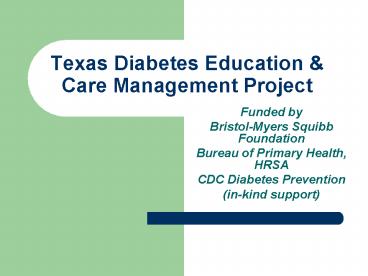Texas Diabetes Education - PowerPoint PPT Presentation
1 / 20
Title:
Texas Diabetes Education
Description:
Texas Diabetes Education & Care Management Project Funded by Bristol-Myers Squibb Foundation Bureau of Primary Health, HRSA CDC Diabetes Prevention – PowerPoint PPT presentation
Number of Views:170
Avg rating:3.0/5.0
Title: Texas Diabetes Education
1
Texas Diabetes Education Care Management
Project
- Funded by
- Bristol-Myers Squibb Foundation
- Bureau of Primary Health, HRSA
- CDC Diabetes Prevention
- (in-kind support)
2
TDECMP Steering Committee
- Bristol-Myers Squibb Foundation
- HRSA/Bureau of Primary Health
- CDC/Division of Diabetes Translation
- UIC Midwest Latino Health Research, Training and
Policy Center - Texas Department of Health Diabetes Council
- Migrant Health Promotion
- Texas Association of Community Health Centers
3
Overview
- Project Goals Objectives
- Diabetes Education Empowerment Program (DEEP)
Training Sessions - Initial Training
- Follow-up Trainings
- Preliminary Patient Outcome Evaluation Results
4
Texas Diabetes Education Care Management
Project (TDECMP) Goals
- Conduct one initial train-the-trainer 3 day
intensive training. - Train 160 community health workers in self care
management using the DEEP curriculum. - Conduct five regional follow-up trainings in
Lower Rio Grande Valley, Laredo, El Paso, San
Antonio, and Houston. - Impact 16,000 diabetic patients or people at risk
of diabetes by providing diabetes education using
DEEP curriculum.
5
Framework for ImplementingDiabetes Self Care
Management Program
Three Step Process
- Patient Empowerment
- Provide Deep classes
- on weekly basis.
- Provide coordinated
- services to patients.
- Program Approach
- Train team of Promotoras
- and Clinical staff on DEEP.
- Recruit patients for
- classes.
- Patient Benefits
- Improved standards
- of care for patient.
- Off set complications.
- Reduced HbA1c.
- Overall better health.
- Reduced Health Care
- costs including ER.
6
24 health workers attended the initial training
representing the five targeted regions.
7
Experiential Learning focuses on both Process and
Content
- Process teaches participants how to disseminate
information using an interactive style of
facilitation.
8
Participants learn how to read food labels
- Typical food plates are converted into fats,
sugars and sodium.
9
Texas Department of Health Bristol-Myers Squibb
staff participate in training
- TDECMP has helped community health centers and
state health agencies change how they work with
people who have diabetes.
10
Some content such as medication management is
covered using traditional methods
11
DEEP Curriculum in Action Diabetes Self Care
Management Program
Delivery Process
Patients Recruitment
Promotora Led Classes
Medical Providers Involvement
Clinical Support Staff
12
Community Health Center Top Five Medical
Diagnosis Profile
(43.3)
(26.9)
(20.7)
(6.1)
(2.8)
N6304 Gateway Community Health Center
Source 2002 UDS
13
Typical Payment Source Category
N14144
Source 2002 UDS
14
Typical Profile of a Patient with Diabetes
- Female
- Age 43
- Hispanic
- Obese
- 4 to 5 Children
- Uninsured
- Low Social Economic Status
- Multiple Family Dwelling
- Sixth Grade Education
- Hemoglobin A1C Higher than 7
- Has a difficult time managing her diabetes
15
Preliminary Patient Outcomes
- Base Line
- HbA1c before DEEP self-management class 9.1
- After Intervention
- HbA1c after self-management course 7.4
- 87 Class attendance rate
- Gateway Health Center Data from random chart
audit (N99 patients)
16
Process Evaluation Results
- The goal of 160 was surpassed with a total of 177
health care staff completing the DEEP curriculum
training. - A total of 7 trainings were completed exceeding
the goal of 6 All five targeted regions
participated in the trainings including Lower Rio
Grande Valley, Laredo, El Paso, San Antonio, and
Houston. Participants from Lubbock, Dallas, and
Austin also attended. - Trainee satisfaction has been very positive with
an evaluations mean score of 4.8 out of a 5.0
satisfaction scale.
17
Process Evaluation Results
- While several trained health centers have not yet
implemented the program completely after being
trained, the majority have committed to implement
a full DEEP self care management program once
project implementation funding is secured. - Trainee limit of 16-20 per session adjusted
upwards to 28 per session to meet demand.
18
Care Management Economic Impact
In collaboration with a third party evaluator, a
budget impact model using data from the enrolled
diabetic patients will demonstrate the near-term
fiscal value attached to the reductions in HbA1c.
Example of cost differentials
for 1 changes in HbA1c over a 3-year period
Patient profile Change in HbA1c level ()
10 to 9 9 to
8 8 to 7 Diabetes only
1,205 869 601 Diabetes with HTN
1,703 1,260 897 Diabetes with
CVD 2,796 2,088 1,503
Diabetes with HTN and CVD
4,116 3,090 2,237 Given the number and
likely comorbidities of the patient population
in the program it is predicted that the savings
generated for a State may be significant.
Reference available upon request Numbers are
summative when one combines a ? HbA1c
19
Texas Care Management Chart Audit100 random
records 8 CHCs
- Assumes same risk stratification as Fla
- High Risk 30 with HbA1c 10 reduced to
7 - Yearly savings
30 pts x 3,150 94,500 - Moderate Risk 20 with HbA1c 9 reduced to 7
- Yearly savings
20 pts x 950 19,000 - Low Risk 50 with HbA1c 8 reduced to
7 - Yearly savings
50 pts x 200 10,000 -
123,500
Yearly Savings for 2,400 patients 2,964,000
Yearly Savings for 10,000 patients 12,350,000
20
Conclusions
- It has become evident that teaching self care
management education such as DEEP to people with
diabetes is perhaps our only chance we have in
helping reduce the onset of diabetes type 2 and
preventing this chronic disease within affected
families. - The DEEP curriculum has been well received by
community health centers, Texas Department of
Health and CDC. Requests for additional training
continues throughout the State of Texas and
across the United States. - Preliminary evaluation results clearly indicate a
great benefit to patients with diabetes type 2.































